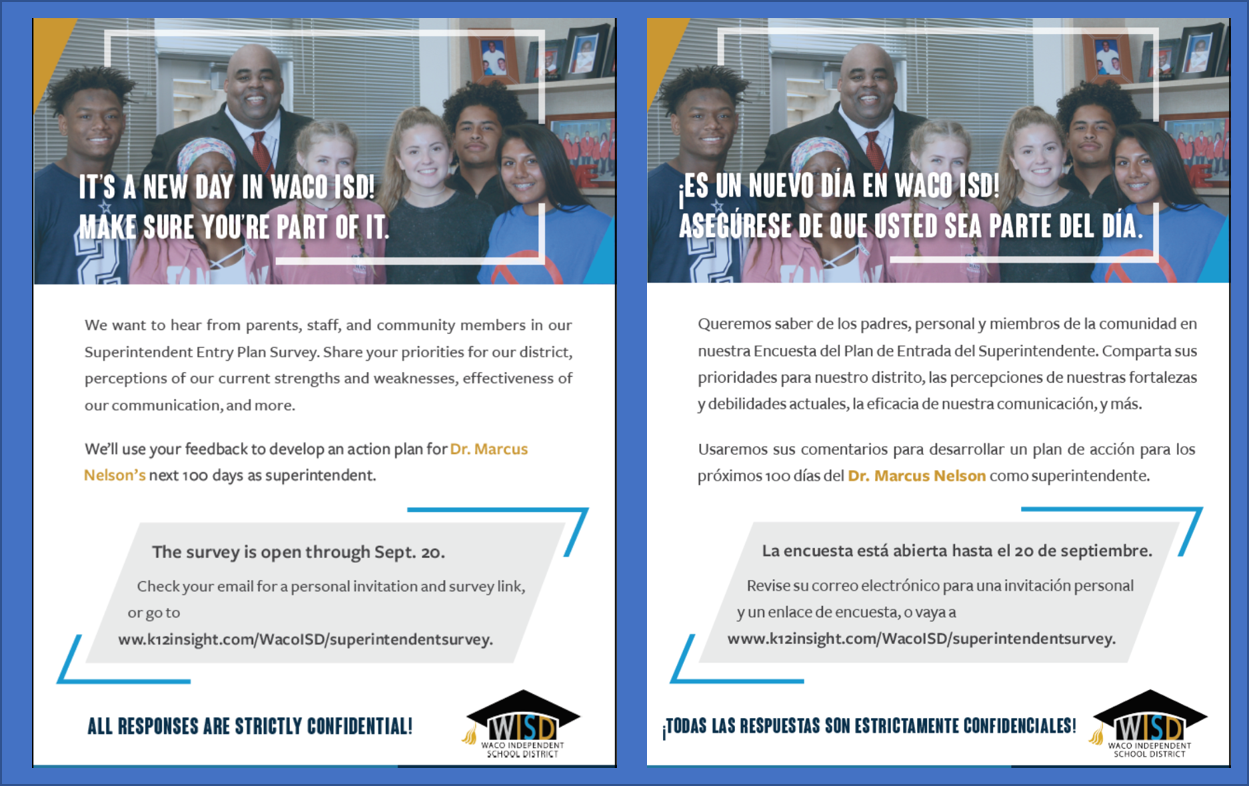By Sheila Whitehead
Try something for me – Google the phrase “parent engagement in school.” What did you find? When I run that search, I find 3.8 million returns addressing or at least mentioning the importance of parent engagement in our schools. 3.8 million returns are ranging from scholarly articles about why it’s important to how schools can encourage parent engagement. Everybody seems to be talking about it – everyone can see the importance of parent engagement. Research over the past 50 years has shown that when parents are involved in their child’s education, school attendance increases; students have higher grades and score higher on tests; and they are more likely to graduate and go on to postsecondary education. Students experience success – something all parents want for their children. But what does meaningful parent engagement really look like?
That’s something that Waco ISD as a district is working toward defining through intentional discussions, surveys and activities all aimed at bringing the community and families into the conversation. New district leadership has sharpened the focus of that intentionality. Community meetings aimed at supporting WISD campuses and students who need it the most are being held. District-wide events are being planned to support literacy, college for all, the involvement of strong male role models, and summer learning. Surveys are being circulated giving families, community members, staff, and students an avenue to express concerns and point out successes.
Campuses are also working to create opportunities to involve parents. In the three years I’ve been at Waco ISD, I’ve had the opportunity to see a huge number of activities across the district designed to encourage parents to become involved – events ranging from Dia de Los Muertos activities and Nachos and Numbers Night to parent/teacher conferences centered around student’s academic needs. All these events are intended to attract parents to campuses, to become involved with the family of educators that work with our children eight hours a day, five days a week and to have a voice in the academic success of those children.
Our schools and our district are charged with the mission, however, to go beyond Nachos and Numbers and to find ways to support our parents as they seek to become part of their child’s education. With barriers ranging from limited resources to time constraints, that can be a daunting challenge! It’s one that Waco ISD is up to tackling though. Be looking for surveys and invitations to parent activities at your school and in the district. Be part of the conversation around parent engagement at Waco ISD.
But – you might ask – what difference can one parent make in reaching out to become actively engaged at your child’s school and in the district? One study found that when parents are involved at school, the performance of all the children in the school tends to improve – not just the children of those who are actively involved (Henderson & Berla, 1994). That is a profound difference.
The district is opening the door to feedback from you – your child’s first teacher. Are you taking the opportunity to help shape what parent engagement looks like at Waco ISD? It’s your right to be informed; it’s your right to be involved; it’s your choice to be engaged.
 Sheila Whitehead works with Parent Involvement Coordinators across Waco ISD in her role as coordinator of federal programs for WISD. She has been an educator for 32 years and enjoys spending time with her family including her 11-year-old daughter Meghan.
Sheila Whitehead works with Parent Involvement Coordinators across Waco ISD in her role as coordinator of federal programs for WISD. She has been an educator for 32 years and enjoys spending time with her family including her 11-year-old daughter Meghan.
By Matthew Polk
Last school year, more than 2,000 Waco ISD students missed at least 17 school days (10% of the school year). Students who miss 10% or more of school in a year are referred to as “chronically absent.” On average, chronically absent students make lower grades, perform worse on standardized tests, and are less likely to pass their classes and graduate than students with better attendance. Most parents don’t realize that missing just two days a month throughout the year makes a student chronically absent and puts them at risk for academic struggles.
The famous movie director Woody Allen is often quoted as saying, “80% of success is showing up.” This statement is pretty true for success in school! It’s obvious that when students aren’t in school, it is hard for them to learn. And we know that students who attend school more often do better on average than those who are chronically absent. This means that one of the most effective (and easiest!) ways that parents can help their children be successful in school is just to make sure that they show up!
But there’s another reason why it’s important for students to be in school: MONEY. Many people don’t know that public schools in Texas receive state funding based on how often students attend school. This financing system is called Average Daily Attendance (or ADA) funding. For every day that a student misses school, Waco ISD loses at least $30 in state funding. Adding up all the school days missed by Waco ISD students last year, we calculate that Waco ISD lost out on at least $2 million in state funding.
Parents and the community usually have a wish list of things they’d like the school district to provide: more arts classes, more counselors and tutors, more afterschool programs, etc. Imagine how many things on that wish list could be done with $2 million. When students attend school, they are not only more successful—they also earn state funding that is used to make their school experience better. That’s a win-win situation for students and the school district.
How do we improve school attendance for Waco ISD students? It’s what we would call a “collective impact” approach—many partners being a piece of the puzzle. Some collective impact projects work with health care providers for mobile clinics and public awareness campaigns. Additionally, when healthcare providers arrange for same-day appointments for sick children first thing in the morning, children get the care they need and then they can go back to the classroom. When follow-up appointments are scheduled after attendance is taken for the day, students can start the day at school, be counted present, and return with an excuse for the missed class time.
Some collective impact projects provide mentors for students and families of chronically absent students. They engage local churches and organizations to assist their members when problems arise with getting students to school. Other collective impact efforts work to eliminate social and emotional reasons for chronic absenteeism such as substance abuse in the home or homelessness. There are many ways for Wacoans to get involved and assist Waco ISD with chronic absenteeism. If schools, families, and community partners all focus on improving student attendance, we can make it happen.
For information about getting involved in the collective impact work to prevent chronic absenteeism in Waco ISD contact me at Prosper Waco, 254-741-0081, or Dr. Robin McDurham at Waco ISD, 254-755-9601.
 This Act Locally Waco Blog post was written by Matthew Polk. Matthew is Executive Director of Prosper Waco. Prior to that, he served as Superintendent of Rapoport Academy Public School. He and his wife attended Baylor, and after spending a few years in the northeast, they returned to Waco to raise their family. They have four children, ages 10 to 2 years old. You can contact him at [email protected].
This Act Locally Waco Blog post was written by Matthew Polk. Matthew is Executive Director of Prosper Waco. Prior to that, he served as Superintendent of Rapoport Academy Public School. He and his wife attended Baylor, and after spending a few years in the northeast, they returned to Waco to raise their family. They have four children, ages 10 to 2 years old. You can contact him at [email protected].
The Act Locally Waco blog publishes posts with a connection to these aspirations for Waco. If you are interested in writing for the Act Locally Waco Blog, please email [email protected] for more information.
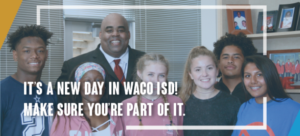 It’s a new day in Waco ISD as Dr. Marcus Nelson takes the helm as superintendent. In the short time since Dr. Nelson arrived earlier this summer, he has brought new energy, high expectations and a focus on rigorous instruction to Waco ISD. The district is launching a survey to create a strong action plan for his next 100 days that reflects the needs of the district.
It’s a new day in Waco ISD as Dr. Marcus Nelson takes the helm as superintendent. In the short time since Dr. Nelson arrived earlier this summer, he has brought new energy, high expectations and a focus on rigorous instruction to Waco ISD. The district is launching a survey to create a strong action plan for his next 100 days that reflects the needs of the district.
All parents, staff, and community members are invited to participate in the survey, and students in grades 6-12 will have an opportunity to take the survey at school. The survey, which will remain open until noon on Sept. 20, asks about community priorities for the district, its strengths and weaknesses, mission and values, communication, and more.
Email invitations with survey links were sent directly to district employees and parents on Sept. 6 if the district had a current email address on file. If you didn’t receive a direct invitation, please go to wacoisd.org/survey for more information, including a video message from Dr. Nelson and a link to the survey. The survey is available in English and Spanish and is compatible with any computer, tablet, or smartphone.
The district has partnered with independent research and communications firm K12 Insight to administer the survey and compile the results. All responses are confidential. No one at the district will know who participated or be able to connect participants to their answers.
The district greatly appreciates the continued support of the Waco community and looks forward to using the input derived from this survey to move forward with strategic and targeted goals to bring Waco ISD students and staff to the next level.
For more information about this survey, contact the Waco ISD Communications Department at 254.755.9454 or [email protected].
Take It Here!
(During December we will be reprising some of “2017’s greatest hits” from the Act Locally Waco blog. I couldn’t possibly pick my favorites – so I used the simple (cop out?) approach of pulling up the 10 blog posts that got the most “opens” according to our Google Analytics. It is an intriguing collection that gives at least a little insight into the interests and concerns of Act Locally Waco readers. I hope this “Top 10” idea inspires you to go back and re-read your personal favorites. There have been so many terrific ones… If you would like to see the Top 10 according to Google Analytics, here’s the link: 2017 Greatest Hits. Merry Christmas! — ABT)
By Andre’ Watkins
Growing up in Waco, Texas, gives you a certain kind of insight. Waco is a mid-sized community that allows its citizens the distinct opportunity to experience all of the levels of socioeconomic strata with ease. Just take a ride down Colcord Ave. You will see the homes of the very affluent and the homes of the desolately hopeless on the same block. This is my Waco.
This Waco has a long history. During the 60’s and 70’s, Waco participated in a federal program called “Urban Renewal” meant to improve blighted areas of town. Under this program (called “Urban Removal” by those who questioned its value) entire family units were removed from neighborhoods where they had built and maintained homes and raised families. Those who remained were expected to pull themselves up by their proverbial bootstraps, which proved to be a difficult task.
Around the mid-eighties, crack cocaine ripped through my beloved city on a euphoric rampage. Crack took from the rich and poor alike. This gruesome drug fueled demon was never a black or white problem. It was a drug addiction problem.
Crack cocaine changed the landscape of Waco. Middle-class families fled to the suburbs. Neighborhood stores closed. Restaurants and grocery retailers were boarded up. This left a power vacuum in the inner city of Waco that attracted crime and despair.
A chasm opened up between the people who left and the often impoverished people who remained. Waco ISD finds itself in the position of needing to bridge this chasm. To bridge this chasm we have to be honest with ourselves: very often there is a serious disconnect between the community we serve as a school district and the service providers that work in our schools.
To address this situation we have to deal with some hard questions: How do we expect people to model their behavior after the behavior of those who left them to languish in lack? Why should I as an impoverished person seek to exemplify a lifestyle of a person or people who won’t even come to my neighborhood? Do you really care about me? Or am I a charity case or pet project?
Realizing this disconnect, we knew that we had to switch up the flow. To combat this monster of our own creation, we began to search for methods that other school districts were utilizing successfully.
Restorative Discipline just seemed to jump off of the pages of training manuals and speak directly to the heart of our issues here in Waco ISD.
To quote from the website of Life Anew, a non-profit in Austin that brings restorative practices into local community schools, “Restorative processes create a space where students and adults can develop empathy, respect and common values by listening and learning from one another. This process helps to increase the effectiveness of instruction time, build community and develop students socially and emotionally.”
At the heart of Restorative Discipline Practices, we find a tradition as ancient as the campfire circles of old, the Intentional Conversation. Intentional Conversations are simply focused discussions that seek to determine the root cause of an exhibited behavior.
We acknowledge the truth in the statement made by Sherwynn Patton, Executive Director of Life Anew, “Adverse behavior is just the smoke; when we find the reasons for the behavior, we locate the source, the fire.” We had been spending too much time putting the waters of our logic and education on the smoke. We never dug deep enough with our conversation skills and listening hearts to determine the location of the fires in our precious students’ souls.
As we began to have Intentional Conversations together as staff at Waco High, we began to seek and find our similarities as PEOPLE and to break down our cultural bias. We then began to spread this infection of emotional affection for the staff through the students into our community. Waco High dropped its rate of suspension by 46% in two years of Restorative Practices implementation. I don’t care who you are or where you are from – That is impressive! We celebrate and invite our community at large to join us in repairing harm and establishing community unity.
 Andre’ E. Watkins is a Restorative Discipline Facilitator at Waco High School. He has 16 years of experience working with at risk youth and their families including serving as Detention Supervisor at Bill Logue Juvenile Justice Center and a Training Officer at McLennan County Challenge Academy. He was a Dorm Supervisor at TYC Mart, and is the only person in the State of Texas to be promoted from JCO 1 to JCO 5 in 30 days. He volunteers at the Doris Miller YMCA, as a Prosper Waco Community Engagement Committee Member and as a Football and Basketball Coach for the Waco Eagles. He is also a Park Ranger for the City of Waco.
Andre’ E. Watkins is a Restorative Discipline Facilitator at Waco High School. He has 16 years of experience working with at risk youth and their families including serving as Detention Supervisor at Bill Logue Juvenile Justice Center and a Training Officer at McLennan County Challenge Academy. He was a Dorm Supervisor at TYC Mart, and is the only person in the State of Texas to be promoted from JCO 1 to JCO 5 in 30 days. He volunteers at the Doris Miller YMCA, as a Prosper Waco Community Engagement Committee Member and as a Football and Basketball Coach for the Waco Eagles. He is also a Park Ranger for the City of Waco.
The Act Locally Waco blog publishes posts with a connection to these aspirations for Waco. If you are interested in writing for the Act Locally Waco Blog, please email [email protected] for more information.
(A follow-up to https://actlocallywaco.org/2016/07/19/service-learning-at-indian-spring-helping-kids-learn-to-be-citizens/)
By Travis Cheatham
Last July I wrote a blog about what service learning looks like at Indian Spring Middle School (ISMS). I explained the structure, the value, and the potential of the program. Today I write about the rewards, challenges, and opportunities of this last year through a few stories. (Names have been changed to protect student identities)
Rewards
Ava is a good student in class but she’s the queen of eye rolling. Throughout the year, I frequently had to coax Ava to get to her service learning group, which ironically she liked, but for some reason, she frequently dawdled in attending. This, by the way, is a common theme among students and is really a fact of life for middle schoolers.
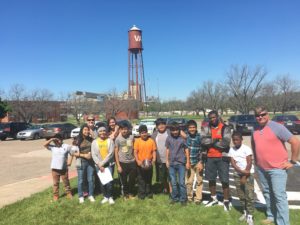 In March, our school planned an event with the VA Medical Center thanks to funds from The Meadows Foundation. Our students decided to use the funds to donate plants, games, and activities for VA residents. Ava was sure to help out with all of the last minute preparations and came to the event on a Saturday morning, no less. The following Monday morning, I was poised at the school’s main entrance to greet students (as I usually do) and Ava came running up to tell me how great a time she had. She then asked if there was any way that she could go back on her own to meet with residents.
In March, our school planned an event with the VA Medical Center thanks to funds from The Meadows Foundation. Our students decided to use the funds to donate plants, games, and activities for VA residents. Ava was sure to help out with all of the last minute preparations and came to the event on a Saturday morning, no less. The following Monday morning, I was poised at the school’s main entrance to greet students (as I usually do) and Ava came running up to tell me how great a time she had. She then asked if there was any way that she could go back on her own to meet with residents.
The lesson: Are you sharing power with your child, mentee, or student? They will relish it and will thrive. I never see our students more fulfilled at school than when they are given a task to perform. Our students have power, talent, and desire, but we have to activate it. In this next year, I hope to have more opportunities to empower our students.
Challenges
“Everyone knows service learning is boring; you’re wasting your time.” This was a common greeting from Tim as I corralled students to get to their service learning groups. I’d love to say that Tim was alone in this belief, but he wasn’t. Last year, our goal was to place all 6th and 7th graders in a service learning group based on surveys of their interests. By the time students met in their first service learning group many were confused about why they were there (even though I spent a week prepping the students).
Although middle schoolers’ decisions are inherently confusing (even to themselves), forcing students to go to something that they have no stake in is an act in vain. With no grades or requirements, our program really depended on a good hook for students’ interest and sometimes the gradual development of interest.
The lesson: This next year students will attend a service learning fair and sign up for any groups they are interested in. If they’re not interested there will be no arm twisting, but we will require students to at least take a look at their options.
Opportunities
“Hey Mike, I’m just calling to …let you know we need to cancel tomorrow due to ______
…remind you that I need you to turn in paperwork for last week’s outline
…apologize for the delay in setting up the field trip, could you do it on …”
The lesson: Although program flexibility is great, universal policies make for a well-oiled machine. As I look at the future sustainability of the service learning program I need to refine a model that can be easily administered and replicated.
How can you help?
Become a facilitator! Facilitators meet with students 1-2 hours once a week throughout the school year to guide the students in developing service projects. This year we hope to use your passions as a volunteer as the springboard for connecting students. Training will start mid-August and the program should start mid-September.
One More Good Story
Every month throughout the school year I would hold a roundtable meeting for all of our service learning facilitators to talk about upcoming events, how things were going, and to provide ongoing training. My favorite part: listening.
I’m under no delusion that I am a master of anything; do you want to know the good news for volunteers? You don’t have to be either! In those discussions, even our facilitators who were not veterans of the program contributed in a way that generated new ideas for the whole group. Those sessions produced innovative and self-critical observations which are essential for fostering real growth both individually and as a program. I am incredibly thankful for the work of my awesome volunteers and cheerleaders of this program.
Not ready to jump in? Give me a call or email and I’ll let you know about other ways to get connected at ISMS. You can also visit our website at http://indianspring.wacoisd.org/cms/One.aspx?portalId=13246&pageId=424889
to learn more about our service learning program or http://www.prosperwaco.org/mentor-coalition/ to see other ways you can mentor students in Central Texas.
 Travis Cheatham is the Service Learning Manager for Indian Spring Middle School. Before ISMS, Travis was the Executive Assistant at Mission Waco and helped lead a culinary class with the MPowerment job development program. Travis is also the Chef/Owner of Cuppa, Waco, TX a catering and food consulting business that was a regular at the farmers market in 2015. Travis is a ’06 Baylor grad who loves this community and loves to travel with his wife, Amy, whenever possible.
Travis Cheatham is the Service Learning Manager for Indian Spring Middle School. Before ISMS, Travis was the Executive Assistant at Mission Waco and helped lead a culinary class with the MPowerment job development program. Travis is also the Chef/Owner of Cuppa, Waco, TX a catering and food consulting business that was a regular at the farmers market in 2015. Travis is a ’06 Baylor grad who loves this community and loves to travel with his wife, Amy, whenever possible.
The Act Locally Waco blog publishes posts with a connection to these aspirations for Waco. If you are interested in writing for the Act Locally Waco Blog, please email [email protected] for more information.
By Fallon Bain
Having graduated from Waco High School hardly a week ago, I have yet to entirely wrap my head around what I just completed. Whoever told me that senior year would be simple assumed that I would not gleefully overcommit myself and would, instead, slow down to enjoy the ride. That was far from the case. If you can look beyond the heaps of college applications, financial aid forms, scholarship essays, and existential crises, yes, this past year was a breeze. It was a breeze in the sense that a never-ending tornado is a breeze – it was an incessant whirlwind of events, deadlines, and activities. Even so, I would not change the past four years for anything. I learned more in my high school career than I ever anticipated, and for that, I am very grateful.
More than any other lesson, high school impressed upon me the importance of finding a healthy balance between my different obligations and commitments. It was only after several years of overcommitting myself that I realized I could not participate in everything I wanted to. On the other hand, some activities, like theatre, were well worth the investment of time and energy. Anyone who has been involved in theatre knows that it entails countless hours of rehearsals and workdays often lasting several months. At the outset of every new production, my instinct was to become as heavily involved as possible. It quickly became apparent that this was unreasonable, and that I would have to restrain myself to a practical amount. It was important to remember that although I had committed myself to the shows, I needed to carefully manage my time to keep up with my school work, responsibilities at home, and wellbeing. Sometimes I failed to maintain a workable balance, but theatre was always well worth the struggle. The joys, fellowship, and pride from every show are some of my favorite memories from high school. I now feel prepared to manage my time adequately in college because my high school teachers had much more understanding and leniency than I expect from my professors, and I learned my limits in a lower-stakes environment.
One of the most difficult lessons I learned in high school, and am still struggling with, is not comparing myself to others. There will always be someone better (and worse, for that matter) than me in any realm I can imagine; there will always be someone prettier, someone smarter, someone more approachable, more talented. It’s hard to not compare my successes and my life with those of others around me when all I see on social media are highlights and carefully curated experiences. It’s natural to want to be the very best, but unrealistic to make it a primary goal. Any competition served as a healthy reminder of that; only one person could be in first place, and more often than not, it wasn’t me. It helped me take inventory of the many positives in my life, and not base my personal worth on the values of others.
In the halls and classrooms of Waco High, I interacted with others with whom I shared very few qualities or interests. Coming from a school filled with diversity opened my eyes to other cultures and family dynamics; I learned empathy for other’s situations and struggles with which I had no personal experience. Developing an understanding of other cultures reminded me that the real world is not homogenous, and I need to be able to communicate effectively with my roommates, classmates, and peers in college and beyond.
From a very young age, Baylor had a large presence in my life. I grew up visiting many homecoming parades, attending Lady Bears’ basketball games as often as possible, and possessing almost as much Baylor gear as the university bookstore itself. When I began applying to colleges, I made sure that I applied to as many as possible, as I wanted to thoroughly explore all my options before making a final decision. I deliberated for months, officially choosing Baylor the week before the enrollment deposit was due. This indecisiveness has carried over into my selection of an academic major; while I know that I want to study science, I have not been able to narrow my interests down to a specific discipline. My dream is to work in some capacity as a researcher, but I will defer my decision until I have had time to formally study within my fields of interest. Very frequently when I tell others I am still undecided, I hear the same words of reassurance: “You have more time to decide.” While this may technically be the case, it seldom feels like it. For this reason, I often wish that I had thought about what I had wanted from my education prior to my graduation.
It is important to be mindful of the lessons you will not learn in school. Therefore, it is important to make an effort outside of the classroom to better yourself and learn on your own. Classrooms will prepare you academically, but there are many life skills you need that are not a part of the curriculum. Ask questions! Try to figure things out; don’t be content with being unaware. My final piece of advice to current students is simple – remember that soon, it will be over. Whenever I had a major deadline or stressor in my life, I had to remind myself that in a week or month I would no longer be worried about it. It may seem crushing at the moment, but time does not stop and this situation will not last forever. Make the most of your current circumstances, and be prepared to move on to the next challenge.
 Fallon Louise Bain is the daughter of Judge Virgil and Glenda Bain. She recently graduated as salutatorian of Waco High School and will be attending Baylor University in the fall. While at Waco High she participated in the National Honor Society, The German American Partnership Program (GAPP) and Academic Achievers. She is a Senior Company Dancer at Laurie’s Stepping Out Studio, a Symphony Belle and a SkillsUSA member.
Fallon Louise Bain is the daughter of Judge Virgil and Glenda Bain. She recently graduated as salutatorian of Waco High School and will be attending Baylor University in the fall. While at Waco High she participated in the National Honor Society, The German American Partnership Program (GAPP) and Academic Achievers. She is a Senior Company Dancer at Laurie’s Stepping Out Studio, a Symphony Belle and a SkillsUSA member.
By Robin McDurham
In a few short days, the teachers in Waco ISD will be giving our students hugs and high fives and send them home for summer. However, learning does not have to stop for ten weeks. There are several things families can do to engage the brain and prevent summer learning loss. Applying academic skills to everyday activities can keep the learning in the forefront. Wouldn’t it be great if this blog posts could start a conversation with the Act Locally community about how we keep learning alive during the summer? Here are a few of my favorites:
- If you are taking a road trip, consider listening to a book on tape together. If you want to push the learning, do a Google search for book discussion questions ahead of time. Focus on questions that require everyone in the car to consider what the author is trying to convey.
- Give the list making duties to the kids. By organizing and writing down items on grocery shopping list, packing list, and chore lists, children are using critical thinking skills and taking ownership of family responsibilities. The potential for learning increases when taking the lists further by creating a weekly meal plan, developing a budget, and charting progress.
- Have a yard sale or open a lemonade stand, and put your child in charge.
- Turn on the closed caption feature on your television to encourage reading along with the shows. When they get good at reading the captions, push them by turn off the sound.
Parents don’t have to prevent summer brain drain all by themselves. Several organizations offer learning opportunities for students during the summer. The short list provided below is a snapshot of opportunities provided by Waco ISD campuses and educators:
Elementary Schools
June 6th-June 30th (8:00 am to 3:00 pm- Monday through Friday). Language Acquisition Summer School for all current English Learners in PK and Kindergarten. The program will be presented at Bells Hill Elementary. We have a great plan for the children filled with intense direct instruction in literacy, language, math, and other disciplines! Transportation is available. Breakfast and lunch will be served. Contact the department at 254-755-9525 for more information.
June 6-8, 12-15, and 19th (8:00 am to 1:00 pm) J. H. Hines Elementary School – Summer Enrichment Program – J.H. Hines is partnering with the YMCA, and other organizations to offer exciting opportunities for students including Tours of McLane Stadium, The Cameron Park Zoo, Waco Wetland, Mammoth Site, World Hunger Relief Farm, Cameron Park, Mayborn Museum, and a Spectacular Science Day. Breakfast, lunch, and transportation will be provided.
Saturday, June 10, 2017 (2:00 pm – 3:30 pm) Author’s Alley at the Waco-McLennan County Library- Waco ISD teacher, Mary Evans, will present a lively reading of her book, Thunder and Lightning. She will talk to the kids about writing a book and what it’s like to be an author. There will be a fun craft for kids to make and take, too. Books will be available for purchase and signing. A percentage of the proceeds will benefit the Friends of the Waco-McLennan County Library.
June 12-15, 10 a.m.-noon – McLennan Community College summer camps- Cooking with the Rainbow – This four-day session will highlight stovetop-based recipes for pre-teens and teens. Main dishes, sides, and desserts will be featured while focusing on a “rainbow” of ingredients. Young chefs will be educated about making meals with a focus on both taste and nutrition. Your son or daughter may even offer to make dinner after this week is done! For ages 13 to 17. Class will be taught by Waco High teacher, Wendy Moulds. Cost: $79 Class ID: AVC 5245.01
June 26-July 14 (8:00 am to 3:00 pm- Monday- Thursday) West Avenue Elementary is hosting VOICE Inc. summer camp from 8am-3pm for students enrolled in 1st through 5th grades.
July 10-15 Waco High School Overture Summer Theatre Camp for Kids – Students entering the 2nd-9th grades and may be enrolled in schools other than WISD. We’re producing 101 Dalmatians. We still have “spots” available. Email klynn.childress@wacoisd.org for more information.
Saturday, August 12 (9 am – noon) Family Fest – food, fun, vaccinations & information, school supplies and backpacks for registered WISD students
Date and times to be announced. The Waco ISD Education Foundation awarded a grant to Kendrick Elementary to refurbish the existing outdoor classroom that had become overgrown and unused. Much of the work will be done this summer so that Kendrick students can start using the garden in the fall. Projects such as building a deck for seating, constructing raised garden beds, and establishing an area for a butterfly garden are on the agenda. Skilled workers and volunteers would be much appreciated. Local businessman Thomas Arnold, the owner of Central Crushed Concrete, has graciously donated the materials needed for a walking path. This will be another task that will require many hands. Work dates have not been determined at this point, but anyone interested in helping can call Dina Hoffman at 254-495-0070.
Middle Schools
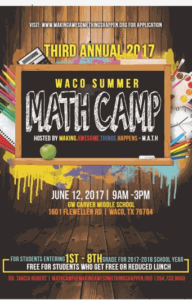 June 12-15 (12:30-2:30 pm.) McLennan Community College summer camps Pasta and Sauces for Teens – Get a taste of Italian as you learn to make a different sauce for each day of this four-day cooking session for preteens and teens. You will learn about different pasta types and salads as well as finish off your meal by making an Italian dessert! For ages 13 to 17. Class will be taught by Waco High teacher, Wendy Moulds. Cost: $79.
June 12-15 (12:30-2:30 pm.) McLennan Community College summer camps Pasta and Sauces for Teens – Get a taste of Italian as you learn to make a different sauce for each day of this four-day cooking session for preteens and teens. You will learn about different pasta types and salads as well as finish off your meal by making an Italian dessert! For ages 13 to 17. Class will be taught by Waco High teacher, Wendy Moulds. Cost: $79.
June 26- July 20th (9:00am-4:00 pm Monday through Thursday) Bulldog Summer Enrichment Program at Indian Spring Middle School for students attending Indian Spring in the 17-18 academic year. Activities include a robotics program, kayaking, rock climbing, swimming, leadership training, team-building, arts & crafts, tennis, soccer, kickball, basketball, gardening, hiking, educational trips, and more.
June 6th – July 20th excluding July 3rd & 4th (1:00 pm – 5:00 pm) – Texas ACE Summer Camp at Carver Middle School campus and Doris Miller YMCA for swimming. The camp is for Carver students who just completed 6th, 7th, and 8th grades. Activities involved: swimming (at the YMCA), gardening with World Hunger Relief, Zumba, Y fitness, reading club, and art.
High Schools
June 5-8 and 12-15 University High School STEM team is hosting Project SOAR a two-week Project Based Learning program that incorporates fun, hands-on activities while learning the important skills needed in Pre-AP, AP, and Dual Credit classes. The two-week program is based on real-world experiences and helps you to develop creativity, critical thinking, problem-solving, and teamwork. The theme for this summer is “Destination Mars.” The program is for students in the UHS 2019, and 2020 cohorts Call Ms. Stephanie Bailey at (254) 756-1843 ext. 2196 or Mr. Jeffrey Cunningham at (254) 756-1843 ext. 2124 for more information or to register.
July 17-20 8:00am to 1:30pm. Freshmen institutes- Waco High School and University High School will be hosting Freshman Institutes for incoming 9th graders to introduce them to high school life. The class of 2021 will learn about study skills required for success, earning credit, getting involved in campus activities, and building the relationships that will help them navigate the next four years of learning.
A few additional plugs
Monday, July 24: 8 a.m. – Registration for the 17-18 school year begins. Parents may register online or at campuses.
Summer Meal Program – Any child up to 18 years old can participate in the Summer 2017 program by showing up at one of the campus, city or mobile sites on the days and during the meal time(s) indicated on the SFSP schedule. Sites will be open all summer from June 5, 2017, through August 14, 2017. Please note the dates and times of service at each location. Meals will not be served before or after the scheduled serving times. Meal times and dates are subject to change. Some sites will be closed on Monday, July 3, 2017, and Tuesday, July 4, 2017, in observance of Independence Day. Click here for the list of Summer Meal Program Sites.
So now for the action part for all of us Act Locally faithfuls. Let’s see how many folks can add to this post by sharing ideas and events for preventing summer learning loss. Add a comment and pass it along. There are roughly 70 days of summer can we shoot for a new learning idea or event for each day?
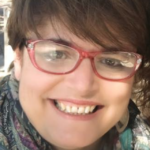 Robin McDurham is an assistant superintendent with Waco ISD. Although she and her husband Doug are currently enjoying life as emply nesters, they had a great experience as Waco ISD parents for 16 years with their sons Zane and Dakota. Robin is passionate about providing opportunities for students that make learning relevant. Contact information: Robin McDurham, Ed.D., Area Assistant Superintendent, Waco ISD. 254-755-9601. [email protected].
Robin McDurham is an assistant superintendent with Waco ISD. Although she and her husband Doug are currently enjoying life as emply nesters, they had a great experience as Waco ISD parents for 16 years with their sons Zane and Dakota. Robin is passionate about providing opportunities for students that make learning relevant. Contact information: Robin McDurham, Ed.D., Area Assistant Superintendent, Waco ISD. 254-755-9601. [email protected].
by Krystal Wilson
 The Greater Waco Advanced Health Care Academy is a unique and innovative program that provides a challenging learning environment to foster student success in the healthcare industry while preparing students for future health care careers. A collaborative partnership exists with Baylor Scott and White Hillcrest Hospital, Providence Hospital, McLennan Community College, Waco Independent School District and multiple school districts including Bruceville-Eddy, Connally, La Vega, Lorena, McGregor, Mexia, Midway, Riesel, Robinson, and Troy High Schools. Through this community partnership, students from the Greater Waco area are provided with the opportunity to participate in hands on learning with a specific focus on patient care. Participating junior and senior level high school students spend half a day at the academy and the remaining portion of the day at their home campus. During their time at the Health Care Academy, students receive valuable classroom experience, and an opportunity to perform clinical rotations in the local hospitals and nursing homes in the area. This allows students to work side by side with certified nursing assistants, licensed vocational nurses and registered nurses in actual health care facilities.
The Greater Waco Advanced Health Care Academy is a unique and innovative program that provides a challenging learning environment to foster student success in the healthcare industry while preparing students for future health care careers. A collaborative partnership exists with Baylor Scott and White Hillcrest Hospital, Providence Hospital, McLennan Community College, Waco Independent School District and multiple school districts including Bruceville-Eddy, Connally, La Vega, Lorena, McGregor, Mexia, Midway, Riesel, Robinson, and Troy High Schools. Through this community partnership, students from the Greater Waco area are provided with the opportunity to participate in hands on learning with a specific focus on patient care. Participating junior and senior level high school students spend half a day at the academy and the remaining portion of the day at their home campus. During their time at the Health Care Academy, students receive valuable classroom experience, and an opportunity to perform clinical rotations in the local hospitals and nursing homes in the area. This allows students to work side by side with certified nursing assistants, licensed vocational nurses and registered nurses in actual health care facilities.
Our Program
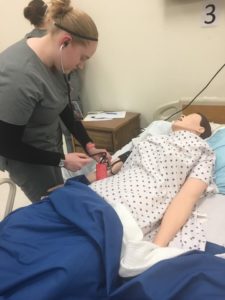 Our program is organized into two distinct pathways. First year students receive instruction in Anatomy and Physiology, World Health Research and Health Science Clinical and Theory classes. This coursework allows students to obtain their Texas Nurse Aide certification and attend clinicals at various long-term care facilities throughout the school year. Second year students explore Pathophysiology and participate in the Practicum in Health Science courses, allowing them to attend clinical rotations at both Providence and Baylor Scott and White Hillcrest Hospitals to focus on acute patient care and career exploration. All students are concurrently enrolled in their traditional high school courses including English, History and Math at their home high school campus to ensure all graduation requirements are met. Dual credit options are also available for qualifying students hoping to get a head start on college courses.
Our program is organized into two distinct pathways. First year students receive instruction in Anatomy and Physiology, World Health Research and Health Science Clinical and Theory classes. This coursework allows students to obtain their Texas Nurse Aide certification and attend clinicals at various long-term care facilities throughout the school year. Second year students explore Pathophysiology and participate in the Practicum in Health Science courses, allowing them to attend clinical rotations at both Providence and Baylor Scott and White Hillcrest Hospitals to focus on acute patient care and career exploration. All students are concurrently enrolled in their traditional high school courses including English, History and Math at their home high school campus to ensure all graduation requirements are met. Dual credit options are also available for qualifying students hoping to get a head start on college courses.
Our Facilities
We are housed in the newly renovated Viking Hills Elementary where we are equipped to provide students with wonderful lab spaces to practice skills and techniques. Our twelve bed simulation lab allows students to manipulate programmable and positioning mannequins and complete patient care skills prior to working on residents and patients in clinical settings. This year we received approval to become our own certified nurse aide testing site. This will 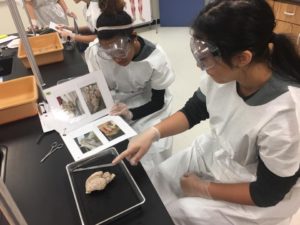 allow our students to complete their CNA test on campus, in a familiar location. Research and the use of technology is an important focus at the academy. Our computer lab provides access to thirty desktop computers often used for research projects, online activities, and dual credit courses. We are also equipped with a mobile laptop cart and a science lab with a primary use of dissections for Anatomy and Physiology.
allow our students to complete their CNA test on campus, in a familiar location. Research and the use of technology is an important focus at the academy. Our computer lab provides access to thirty desktop computers often used for research projects, online activities, and dual credit courses. We are also equipped with a mobile laptop cart and a science lab with a primary use of dissections for Anatomy and Physiology.
Our Faculty and Staff
This unique program employs healthcare workers with strong content knowledge and industry experience to transition into the teaching profession to work with our students. Our staff includes a registered nurse, several licensed vocational nurses, a simulation lab coordinator and a laboratory technician.
More Information
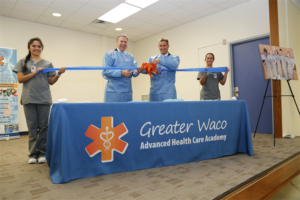 GWAHCA opened its doors in August of 2015 and continues to grow. The academy utilizes community input and guidance from an advisory board to explore ways to meet community needs and serve student interests to determine the best career pathways for future expansion. Students must apply each year to attend with the application window opening from January-March. If you would like more information about the Greater Waco Advanced Health Care Academy visit us at www.gwahca.net or check us out on Facebook for the most recent academy pictures and updates.
GWAHCA opened its doors in August of 2015 and continues to grow. The academy utilizes community input and guidance from an advisory board to explore ways to meet community needs and serve student interests to determine the best career pathways for future expansion. Students must apply each year to attend with the application window opening from January-March. If you would like more information about the Greater Waco Advanced Health Care Academy visit us at www.gwahca.net or check us out on Facebook for the most recent academy pictures and updates.

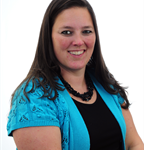 Krystal Wilson has worked with Waco Independent School District for 15 years serving at the elementary, middle and high school levels as a teacher, instructional specialist and campus administrator. She lives in Waco with her husband, Clint, and their two children, Grady and Maggie.
Krystal Wilson has worked with Waco Independent School District for 15 years serving at the elementary, middle and high school levels as a teacher, instructional specialist and campus administrator. She lives in Waco with her husband, Clint, and their two children, Grady and Maggie.
The Act Locally Waco blog publishes posts with a connection to these aspirations for Waco. If you are interested in writing for the Act Locally Waco Blog, please email [email protected] for more information.
By Victoria Ette
Jordan Haynes is a 14-year-old 8th grade student at Indian Spring Middle School in Waco ISD. He was born and raised in Waco, and loves the downtown area. He says that if he could, he would spend all of his time there adventuring and partaking of the many things that there are to do downtown. He is a member of the Mighty Med Club, which is an afterschool program offered by Indian Spring Middle School. It is led by Baylor’s Multicultural Association of Pre-Health Students. Although Jordan wants to attend school at Texas A&M University and pursue a career in photography, he says that the Mighty Med Club has taught him a great deal about the realities of college life and what it takes to pursue his dreams. Jordan enjoys the mentoring relationship he has with the Pre-Health Students, and he loves to proclaim, “Baylor is bringing Waco back to life!”
“Pre-Med Club” is an after-school club that springs from Baylor University’s Multicultural Association of Pre-Health Students (MAPS) Pipeline Program. The objective of the Pipeline Program/“Pre-Med Club” is to introduce students to medicine early on in their academic careers so that they may acquire all the necessary knowledge and resources upon matriculating into high school. This will enable them to excel in a curriculum (and engage in extra-curricular activities) to best prepare them for a post-secondary education and their future careers.
The club aims to expose students to diversity in the healthcare field, introduce students to medical professionals of various backgrounds, to teach and mentor students about the medical field, and give them support in how to excel in their academic careers. We are especially excited to reach minority students, a population also reflected in the MAPS members, because we recognize the power of representation. Seeing someone like oneself reflected as a positive role model, particularly in the face of prejudice, discrimination, and underlying systemic prejudice is powerful in its effect to validate one as a human being. Exposure to successful college students and future professionals makes one’s goals seem much more obtainable. Finally, we want to instruct students about medicine in a way that is fun, interactive, relevant, and impactful.
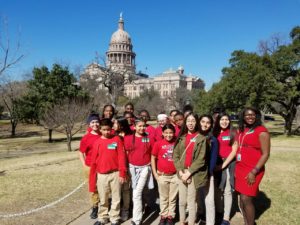 The after-school program was launched in the Fall of 2016 at Indian Spring. Kattina Bryant, Indian Spring After School Program Manager, said that the Pre-Med club has been an opportunity for WISD students to realize there is no limit to what they can achieve. The Indian Spring students are excited about learning with a different focus. When we went to the State Capitol for the Go Red Event through the American Heart Association, students had the chance to connect the lessons learned in the club with information about preventing heart disease and stroke. The learning is relevant and the students are highly engaged.
The after-school program was launched in the Fall of 2016 at Indian Spring. Kattina Bryant, Indian Spring After School Program Manager, said that the Pre-Med club has been an opportunity for WISD students to realize there is no limit to what they can achieve. The Indian Spring students are excited about learning with a different focus. When we went to the State Capitol for the Go Red Event through the American Heart Association, students had the chance to connect the lessons learned in the club with information about preventing heart disease and stroke. The learning is relevant and the students are highly engaged.
Jordan and his friends enjoy learning about the human body and how their own bodies function. He says that he has always been curious about medicine, how it is made, and how it is distributed. Jordan’s favorite experience so far in Mighty Med Club was when Dr. Barry, a local pediatrician in Waco, came to speak to the Mighty Med Club students. He thought that it was inspiring to see a male African-American physician working in a professional field such as medicine. Jordan’s take away from Dr. Barry’s presentation is that “even though we as African-Americans are sometimes looked down upon, we are still able to rise to the top and follow our dreams.” Jordan states that Mighty Med Club has allowed him to see that even though college will be hard, he is more than capable of succeeding at the university level.
 Victoria Ette is a senior at Baylor University pursuing a bachelor’s degree in Biology. Victoria has been a champion supporter of Waco ISD, and a tutor for Communities in Schools and Waco High School. She has led Service Learning projects at Cesar Chavez Middle School and initiated the Pre-Med Club at Indian Spring and Carver. She plans to attend medical school after graduation.
Victoria Ette is a senior at Baylor University pursuing a bachelor’s degree in Biology. Victoria has been a champion supporter of Waco ISD, and a tutor for Communities in Schools and Waco High School. She has led Service Learning projects at Cesar Chavez Middle School and initiated the Pre-Med Club at Indian Spring and Carver. She plans to attend medical school after graduation.
By Bruce Gietzen
Remember the Jeff Foxworthy TV show “Are you smarter than a 5th grader?” I remember watching, and too many times the answer to that question was a resounding “No”!
That was old school. Waco ISD has a newer – and younger version that may make you feel even more embarrassed unless you’re a parent of one of our 4-year olds in the District’s acclaimed prekindergarten program.
Every Waco ISD elementary campus plus University High School has at least one of those early success classrooms – there are 55 in all. Each and every one of nearly a thousand students in the program get a great start on being smart.
Plus, it’s not just the little folks who learn. Moms and Dads in those families are having intelligent dinner conversations with their children because of our family engagement plan.
Kids go home with letters – in English and Spanish – that explain the Science, Technology, Engineering and Math they’re learning. Those letters also include questions parents can ask about the class day, so students barely old enough to tie their shoes can tell Dad how heat can turn a solid into a liquid.
It’s all pretty cool, and apparently state lawmakers agree. They appropriated $118 million dollars for high quality prekindergarten programming. Waco ISD got nearly $650 thousand dollars of that to spread over two years, and those funds are making a good program even better.
To qualify to get money, school districts were required to meet enhanced quality standards in curriculum, teacher qualifications, academic performance and family engagement. WISD was already on board with most of those.
The comprehensive science curriculum encourages learning by doing, and doing it a lot more often. Two years ago Waco ISD teachers reported spending an average of 36 minutes each day on STEM related instruction in preschool classrooms. The national average was about two minutes per day.
That 6,120 minutes – or more than 100 hours of added STEM learning – led to astounding results.
A 2016 Meadows Children at Risk Pre-K report found economically disadvantaged third graders who attended full day Texas pre-kindergarten had 40 percent higher odds of reading at a college-ready pace in the third grade (the key grade to measure reading proficiency).
Those same students also scored approximately 80 points higher on the 3rd Grade STAAR Reading exam.
I haven’t even gotten to the best part. If your child qualifies for the Waco ISD program, it’s FREE!
When the state provided the funds to pay for half a day of instruction for these young people, WISD’s Board found the money to pay for the other half. Thank you, Trustees, for that wise investment in our future!
You should know not everyone qualifies for the program. Family income is a factor, and so is age. A child is eligible for enrollment if he or she is at least four years old by Sept. 1, and meets at least one of the following criteria:
- Unable to speak or comprehend the English language;
- Educationally disadvantaged (which means a student eligible to participate in the national free or reduced-price lunch program);
- Homeless (This is more common than you think. Waco ISD has more than 1,000 homeless kids in K-12);
- The child of an active duty member of the U.S. armed forces;
- The child of a member of the U.S. armed forces who was injured or killed while serving on active duty;
- Is or ever has been in foster care.
There is a teacher and a teacher’s aide in every classroom, which means an 11-1 ratio of educator to student.
What kinds of things will they learn? Simple science investigations help them ask the right questions, gather information, and make informed decisions. Then they will knock your socks off explaining their findings.
These young students will study several new vocabulary words each day, and by the end of the year the ones who are learning English as a second language will know 1,000 more words and the correct sentence structure for using them. By the 2nd grade those kids will be fluent in two languages.
There’s also classwork in reading, writing, fine arts, and social studies – including the importance of voting. For good measure, preK students also practice basic functions on computers and related digital technologies, which breeds self-confidence.
Interested? Registration is in May, and if your child is the right age and meets one of those requirements listed above, it’s free. It’s one of the best investments you can make in your children.
That’s something even a 4-year-old can figure out. Especially one of ours!
I wonder if Jeff Foxworthy has been to Waco?
 Bruce Gietzen made the move from News Anchor at KXXV-TV to the Director of Communications at Waco ISD last June. He crossed from one side of the media fence to the other to help tell stories about some of the great things happening in WISD, including the efforts to revive the Planetarium at Waco High School. Bruce is also on the Board of Directors for Communities in Schools and the Texas Sports Hall of Fame, and he’s a member of the new Communications Task Force for Prosper Waco. He enjoys Waco with his wife, Dana, and if he had more spare time it might be spent on the golf course.
Bruce Gietzen made the move from News Anchor at KXXV-TV to the Director of Communications at Waco ISD last June. He crossed from one side of the media fence to the other to help tell stories about some of the great things happening in WISD, including the efforts to revive the Planetarium at Waco High School. Bruce is also on the Board of Directors for Communities in Schools and the Texas Sports Hall of Fame, and he’s a member of the new Communications Task Force for Prosper Waco. He enjoys Waco with his wife, Dana, and if he had more spare time it might be spent on the golf course.
The Act Locally Waco blog publishes posts with a connection to these aspirations for Waco. If you are interested in writing for the Act Locally Waco Blog, please email [email protected] for more information.
- « Previous
- 1
- 2
- 3
- Next »

